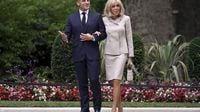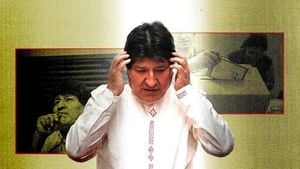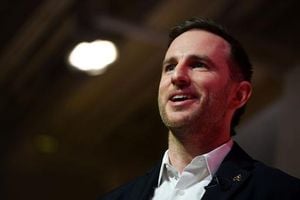French President Emmanuel Macron has launched a rare and high-profile lawsuit in the United States, targeting right-wing media personality Candace Owens over her persistent promotion of a conspiracy theory about his wife, Brigitte Macron. The legal action, filed last month in Delaware, has ignited a cross-Atlantic debate over defamation, freedom of speech, and the global reach of online misinformation.
Owens, a 36-year-old American commentator with millions of followers, has for over a year claimed to her audience that Brigitte Macron, now 72, was born male under the name Jean-Michel Trogneux. The allegations, which first surfaced in France in 2021, were picked up by Owens in an eight-part podcast series titled "Becoming Brigitte." The series, as reported by Paris Match and Daily Mail, delved into the origins of the conspiracy and questioned the French first lady’s identity, despite categorical denials from the Macrons and their advisors.
In his first public comments since the lawsuit was filed, Macron pulled no punches. Speaking to Paris Match, the French president called Owens a liar who “knew very well that she was spreading false information” with the aim of causing harm and serving an ideology. “They’re talking about the identity of the first lady of France, of a wife, mother and grandmother. It’s a matter of defending my honor,” Macron declared, according to AFP. He emphasized that he had rejected his aides’ advice to drop the matter, explaining, “This has become such a big issue in the United States that we had to respond. It’s a question of having the truth respected.”
The lawsuit, which includes 22 counts, accuses Owens of intentionally spreading the transgender rumor to “promote her independent platform, gain notoriety, and make money,” as outlined in court documents cited by Daily Mail. The Macrons claim they have suffered substantial reputational damage and spent considerable sums to correct the public record. They are seeking a jury trial and punitive damages, though no trial date has been set as of August 21, 2025.
Macron’s legal team, led by attorney Tom Clare, took the unusual step of hiring Nardello & Co., a top corporate intelligence firm, to investigate Owens’ background and document her public statements. According to Financial Times, the investigators detailed Owens’ connections to far-right groups in France, the UK, and the US, as well as her interactions with a Russian nationalist. They also noted her political evolution from a self-identified liberal to a conservative figure and her past support for Donald Trump, which she has recently distanced herself from.
The decision to take legal action was not made lightly. Macron admitted he and his wife initially hesitated, wary of the so-called "Streisand effect"—the risk that confronting the rumors would only amplify them. But as the theory gained traction among American audiences, being discussed by prominent MAGA figures like Tucker Carlson and Joe Rogan, the French president felt compelled to act. “It grew so big in the United States that we had to respond. It is a matter of upholding the truth. It’s about defending my honour. Because this is nonsense,” Macron told Paris Match.
The president also addressed the broader implications of the case, pushing back against arguments from Owens and her supporters that the lawsuit represents an attack on American free speech. “It is not freedom of speech to want to prevent the truth from being restored. Those who talk about this supposed freedom of speech are the people who ban journalists from the Oval Office. I don’t accept that,” Macron said, referencing the Trump administration’s decision to bar certain mainstream outlets from the Oval Office and Air Force One.
Owens, for her part, has responded with characteristic bravado. On her podcast on August 21, 2025, she mocked the French president for not mentioning her by name during his interview, joking, “He will not say my name! I feel like Destiny’s Child! He’s acting kinda shady… Macron, say my name!” She dismissed the lawsuit as “goofy” and a “vicious public relations” stunt, vowing to fight the case in Delaware. “I am fully prepared to take on this battle,” she said, according to Daily Mail.
Owens and her allies have framed the lawsuit as an attempt by a foreign government to curtail an American journalist’s First Amendment rights. They argue that Macron’s legal offensive is an overreach, designed to silence criticism and set a dangerous precedent for international censorship. “This is about more than just me,” Owens said on her show. “It’s about the right to question those in power, no matter where they live.”
Macron, however, is adamant that the case is not about stifling legitimate scrutiny but about combating what he calls “malicious nonsense.” He maintains that freedom of expression must have limits when it comes to deliberate falsehoods causing real harm. “[Owens] is someone who knew very well that she was spreading false information and did so with the aim of causing harm,” he said, as reported by AFP.
The origins of the conspiracy theory trace back to a 2021 claim by spiritual medium Amandine Roy and self-described investigative journalist Natacha Rey. The theory simmered in the French online fringe before being picked up and amplified by Owens to her American audience. The Macrons’ legal complaint alleges that Owens repeatedly ignored requests to retract her claims and continued to profit from them, even as the couple’s reputation suffered.
Legal experts note that the case is highly unusual. It’s rare for a foreign head of state to sue an American media figure for defamation, especially in a US court. The outcome could have significant implications for cross-border speech, the responsibilities of influencers, and how public figures defend themselves in the digital age.
Meanwhile, the political undertones of the dispute are hard to ignore. Macron’s swipe at the MAGA movement and the Trump administration’s media policies has added fuel to the fire, with both sides accusing the other of hypocrisy and overreach. Owens seized on Macron’s comments about the White House as a veiled attack on Trump, further politicizing the spat.
As both camps dig in for a protracted legal battle, the story has become a lightning rod for debates over truth, accountability, and the limits of free expression in a world where rumors can cross borders in seconds. With no trial date set and both parties vowing to fight on, the outcome remains uncertain—but the stakes for public discourse on both sides of the Atlantic are clear.
The Macrons’ determination to confront the conspiracy head-on, rather than let it fester, marks a notable moment in the ongoing struggle between public figures and the viral power of online misinformation. As the legal drama unfolds, it’s a reminder that in today’s interconnected world, reputations—and the truth itself—can be contested on a global stage.





